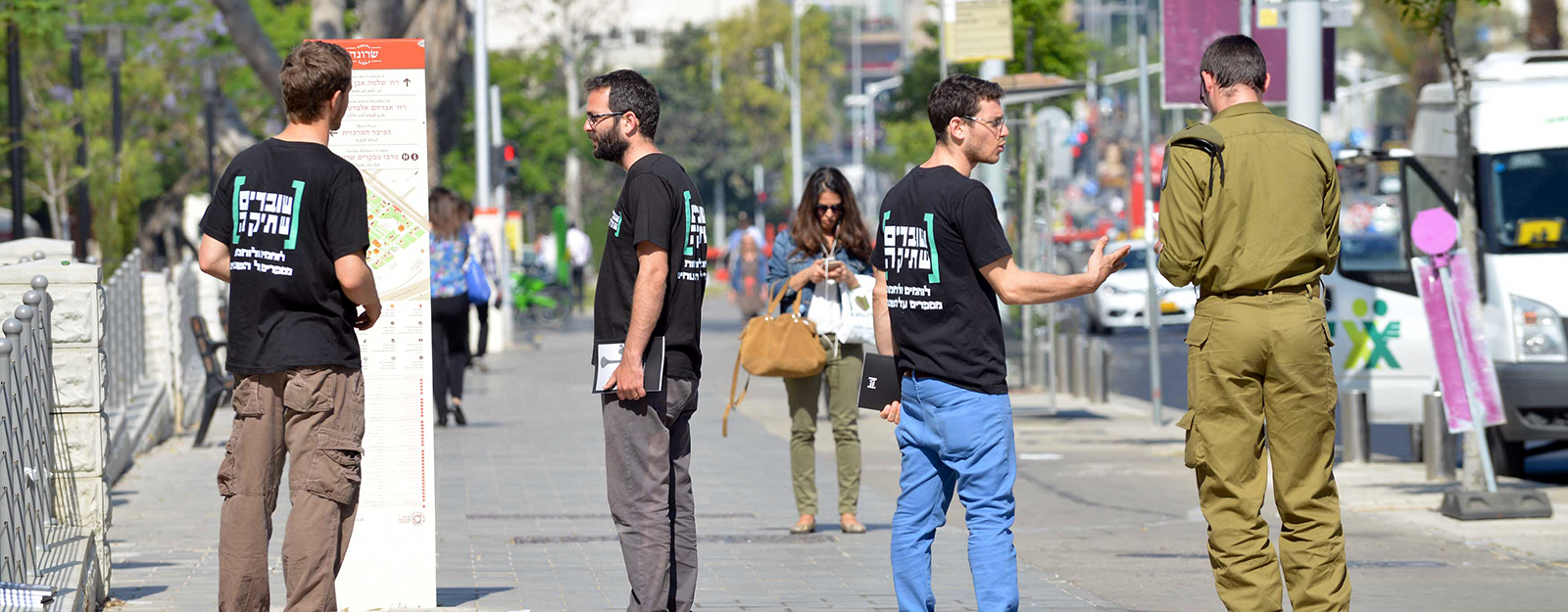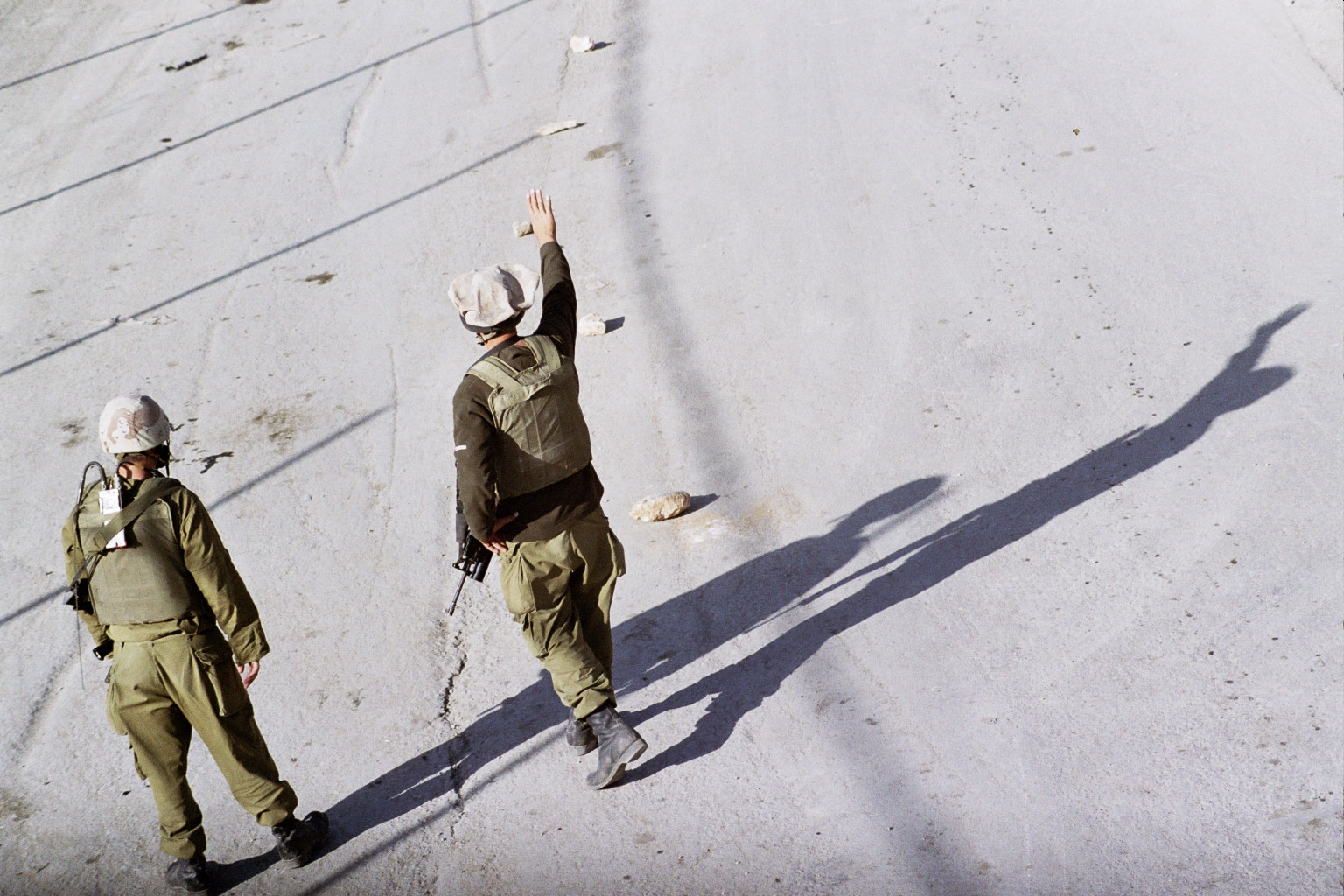Where did that flag come from?An incursion, some house.
The guys just brought it along?Yes, yes. And once I took a ride with intelligence guys on some jeep and they drove me to the base, and there was an awful stench and we asked them what it was, so they said, "See that black bag hanging out the vehicle?" It was this armored jeep. "See it near the hood?" I said, "Yes." So they said, "There are clothes of the terrorist who was killed near Kisufim yesterday, in the bag." So I asked, "Why are you taking it with you?" They said, "What do you mean? We collect them, to put in the office., but don't tell anyone you've seen it." Like, they keep these things.
Keep them systematically?I don't know if it's systematic, but they took it as a souvenir, thought it was cool.
Those clothes?Yes, Israeli army fatigues off a terrorist who infiltrated near Kisufim.
Just the fatigues?Just the fatigues. That's what they said. I don't know. It really stank, I don't know what was in that bag, but I've seen this pretty mechanical behavior, pretty bestial. Not one of the people who served in that division HQ doesn't come in too much daily contact with Palestinians or with combatants that he can let's say beat them up at the checkpoint because he's just fed up or something. It was more like, "Hey, you want to watch the tape of that British peace activist who was killed in Rafah? Run over by a D-9 bulldozer? (The interviewee refers to the event on 16.3.2003 where American activist Rachel Corrie was killed) Let's go see the film." They disconnect, like.
That was part of the atmosphere?Yes, sometimes it seemed like something social. I mean, not to the extent of having photos of dead bodies as screen savers, but still, I mean keeping the fatigues of a dead terrorist in your office, seems to me a bit sick.
Officers and soldiers alike, no difference?Not at all.
And the film showing the peace activist, how widespread was that?It was something that was talked about, I mean they didn't show it to everyone in the evening at the lounge, but it was something that, perhaps, I was more exposed to as an officer, and all the women-officers at the war-room and anyone else who dealt with de-briefings and the like, so I heard things from them and I was also interested in it. It was definitely something people discussed, and soldiers were definitely aware of it, too. Also, from their second night there, soldiers began to ignore gunfire, and the only reason they would listen when being told to retire to safe spaces was because they didn't want to work. Everyone was equally detached.
Were you there when that incident took place with the peace activist and the bulldozer?Not on the spot.
You were at division HQ?Yes.
What were the reactions afterwards? Was there an investigation?There was. I can't really tell you the conclusions and consequences, and I don't really remember very much, but from what I do recall. . . talking with a friend of mine who was an officer at the war-room and involved in the investigation, she told me that in the film she is seen standing back so that the driver of that D-9 could not possibly have seen her, that she was standing behind some concrete slabs. So I mean it was terrible, I don't know what exactly happened there, could be true, but usually there was this tone that we are never wrong. Investigations were held, plenty of them. I sat over hundreds of investigations, day and night, but on the level of the more junior officers and soldiers, it was like everybody wants to slander us, and we are right, and what can you do, in war even we make mistakes.
How do you explain people's behavior, your own behavior? When all the guys sit there together watching a film of a person dying?These are perfectly normal people, if there is such a thing. It's a defense mechanism. I realized I fell into this too, all the time, because otherwise you can't cope. That one time after being at the tank incident, because I chose not to run away and not to use this defense mechanism and say let's let this slide, not look at humans as totally human, I really didn't manage to function after that. I mean, if you want to function you have to protect yourself, you must not feel too much. You have to be rather mechanical and detached. So I don't think these are bad people or animals or I don't know what. It's everyone, each in a different way and to a different extent, but this kind of detachment is pretty sweeping.
Does it seem to you one of those things that sticks with a person?Yes. I am sure that it's different with every person. I am sure that many people experience it much more than I do, and others less, but it sticks. Sure it sticks.
How do you feel it has stuck with you?That time of my life I seem to have lived in a movie. Looking back I realize I had this kind of self-destructive bent and didn't care about anything, but really, anything at all. I don't know, it's this surreal thing that I simply cannot explain, I can't explain how such things happen. How I stood there at the sentry box with my bullet proof vest and loaded M-16 each week, because even officers stood guard duty at division HQ, watching stunningly beautiful sunsets over those smooth sand-dunes of Gush Katif while behind me, in front of me, and all around me people shot each other and demolished each other's houses. I cannot explain it, this is something I'm still dragging around inside because I don't understand. I don't understand how humans can behave this way. I don't understand how such things happen in the world. So I don't know how I was a part of this, and how in a way I let myself be a part of this for half a year, because only in my last month there did I really, truly say I can't take it any longer. So it's something that stays with you all the time. It's also something the army doesn't really know how to handle, with – I don't know what to call it – scars or trauma or psychological damage to soldiers as a result of what they do in the army. I mean, not because of their personality problems but the things to which they're exposed. It's something no one handles, no one talks about, and as an education officer I was supposed to do all kinds of evaluations and talk about the unit's morale and to what extent the soldiers are in solidarity and believe in their mission and how much they blah-blah-blah. As I said in the beginning, a 19-year old girl is not supposed to do this, and to be frank, talking about the extent of social solidarity they show when their mates are getting killed on a daily basis seems pretty stupid and out of place to me, and not really relevant.
How did soldiers react to this situation? What did you see?Truth is, I actually saw situations of two main types: for one, we (education corps) gave them all kinds of recreational activities, brought them entertainment crews and things like that, and then I saw the most insane letting-go. Really, or we'd come visit army posts and talk with soldiers on eight-hour duty shifts alternating with eight-hour breaks. They are frustrated, exhausted. I don't know, I'll tell you in general terms. I don't understand how and why the army thinks it can perform any effective work if it stations soldiers to stand guard in such a frustrating, exhausting, exasperating manner, and I understand soldiers who were extremely frustrated and took it all out God knows how. I don't justify this for one minute, but I think I too would go insane were I in their shoes. I can imagine how a soldier can fall asleep on guard duty, do drugs on duty, beat up people, go home and beat up the whole world, drive a car like a maniac, because somehow it seems to me they've already lost it, much more than we have. I mean, if I lost it and simply couldn't give a damn, then they certainly lost it. At least from where I saw them, they've lost it. They've simply gotten into this rage, this enormous anger directed at anything, and despair and frustration. Once I visited an army post right on the beach. It was a sunny day, some Saturday in spring, a charming day, and the dunes and the glimmering sea and the guys all looked so sad, so very sad, so at loss to understand what they were doing there, what was wanted of them. Nor did they seem to care too much about the ten families in the settlement they were supposed to defend. They only wanted to sleep, just to go home. Like, it's much more intense than the way we experienced it, but it's also a kind of detachment, I think.









 testimonies
testimonies  media & content
media & content 










 I seem to have lived 'in a movie'
I seem to have lived 'in a movie' 

 terms of use & privacy policy
terms of use & privacy policy